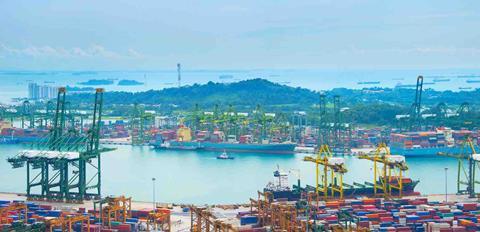At the International Maritime Organization’s (IMO) Marine Environment Protection Committee (MEPC), the association agreed to revise its greenhouse gas (GHG) mitigation strategy and adopted revised guidelines for exhaust gas cleaning systems (EGCS), among other climate-focused initiatives.

At MEPC, which met for its 77th session from November 22-26, the IMO agreed to initiate a revision of its strategy on reduction of GHG emissions from ships, recognising the need to accelerate the process. A revised draft will be presented at MEPC 80; proposals are encouraged from member states and international organisations ahead of MEPC 78 for discussion.
During the latest MEPC gathering, various medium-term emission reduction strategies were discussed. The proposals presented at the Intersessional Working Group on Reduction of GHG Emissions from Ships (ISWG GHG 10) covered: the legal framework of mid-term measures; principles of possible market-based measures; a GHG levy, a GHG fuel standard, a GHG cap-and-trade system, and possible combinations of these; and the principles of carbon pricing, management and disbursement of carbon revenues.
The Initial IMO GHG strategy recognises that the impacts of proposed measures on states should be assessed and taken into account as appropriate, with particular attention paid to the needs of developing countries, especially small island developing states (SIDS) and least-developed countries (LDC).
The committee agreed to establish an ad-hoc impact assessment workshop that will consider concrete proposals for improving the impact assessment procedure and provide recommendations as part of the lessons-learned exercise. The outcome of this will be submitted to ISWG-GHG 11. The workshop is set to be held from March 8-9, 2022.
Furthermore, a Correspondence Group on Carbon Intensity Reduction was established. This group will finalise and update guidelines that relate, in particular, to EEXI and operational CII requirements for ships. These mandatory rules are expected to enter into force in November 2022, aiming at 40 percent reduction of carbon intensity by 2030.
MEPC also approved the MEPC circular on 2021 guidance on treatment of innovative energy efficiency technologies for calculation and verification of the attained EEDI and EEXI, particularly accommodating the use of wind as a source of propulsion.
MEPC also adopted a resolution that urges member states and ship operators to voluntarily use distillate or other cleaner alternative fuels or methods of propulsion that would minimise black carbon emissions from ships when operating in or near the Arctic. Updates to 2015 guidelines on EGCS systems were also agreed; a sub-committee will discuss the harmonisation of rules and guidance on EGCS discharge water into the aquatic environment on April 9, 2022.
Decarbonising shipping is undoubtably a large task. The steps agreed above indicate that while progress is being made, any notable change will be slow.
















